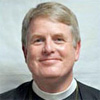“How can you tell a faithful Muslim?”
I was teaching an adult education class in my parish. We were discussing the three great monotheistic faiths: Christianity, Islam, and Judaism.
The answers were pretty quick in coming: “Pray five times a day facing Mecca.” “Fast during the daylight hours during Ramadan.” “Make a pilgrimage to Mecca during one’s lifetime.”
I asked a similar question about Judaism and the answers came just as quickly: “Keep the Sabbath from sundown Friday to sundown Saturday.” “Keep kosher.” “Keep all 613 Mitzvot.”
“What about Christians?” There was some extended silence and then tentatively one person said: “Well, I guess, going to church and trying to live a good life.” Heads nodded. It seemed we had agreement.
I was not really surprised, but that does not mean I was not disappointed. The truth is Christianity does have particular practices that define us as much Islam and Judaism. Unfortunately, to some extent, over time, we have not understood them as being central to our discipleship. So, we get the common answer: “Going to church and trying to live a good life.” Some, but not all of these practices are:
• Participating in the Eucharist on the Lord’s Day.
• Offering hospitality to others
• Forgiving sins against us
• Testifying to the faith that is in us
• Serving the poor
There are more, of course, but the above are the ones that have been universally present in our tradition for 2000 years.
We ought to be clear with those we lead that the above practices are central to our common identity in Christ in the Church. Being faithful is more than just going to church and trying to live a good life. Our practices are more particular than that.
Scott Benhase is the Episcopal Bishop of the Diocese of Georgia.














